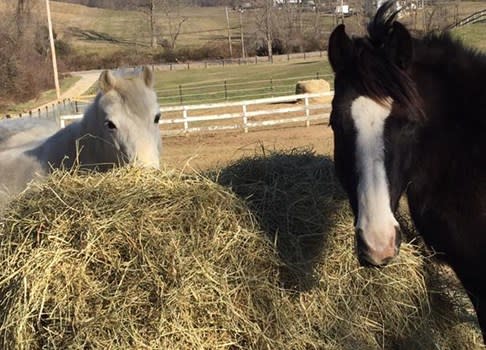February 15, 2017

The days may be getting longer, but the weather is getting colder. Winter can be difficult for horses and their owners. Rescues typically receive the most calls this time of year because the grass is long gone and hay prices in many parts of the country remain high.
Although we encourage prospective owners to be aware of the costs of horse ownership before taking on the responsibility, the reality of winter care costs can still come as a surprise to some.
Just before the New Year, the local ABC affiliate in Jonesboro, Arkansas, aired a story about the increasing numbers of equine abuse and neglect cases being reported (http://www.kait8.com/story/34110719/horse-abuse-cases-are-up). I have not seen data to indicate that this trend is occurring nationwide, but the amount of media coverage certainly seems to be on the rise.
Whether numbers are truly increasing or not, it is important of find solutions to help the at-risk horses we hear about almost every day, whether it be through seizures and rehabilitation, one-day open shelters, owner education, or safety net programs.
What I particularly liked about the article is the notion that these cases are rarely intentional. As Margaret Shepherd, Director of the Northeast Arkansas Humane Society pointed out, a donation of hay or simply scheduling a vet visit can often address the problem.
So, this month, I wanted to write about safety net programs. It only seems logical that we can decrease the number of horses that become unwanted by helping owners keep their horses through the winter or other periods of hardship. These programs can potentially help a horse, an owner, a rescue, and another horse that the rescue can care for in its place; so it sounds like a four-time win to me!
But, will supporting these programs really make a difference? I’m on a mission to find out.
In the meantime, the UHC is in the process of contacting several organizations around the country to learn about their programs, the owners that utilize them, and overall effectiveness. Although far from scientific, we hope to collect enough meaningful data to make some decisions about future fundraising efforts and programmatic goals.
If you have received safety net assistance, or know someone who has, we’d love to hear from you. Tell us if receiving financial help made the difference between keeping the horse or giving him up, and tell us if the horse was still relinquished despite the help.
If you offer safety net assistance, we are eager to hear your results.
For owners who need help now, the UHC maintains a list of organizations that offer safety net programs (http://www.unwantedhorsecoalition.org/resources-for-owners/). These include feed and hay programs in 14 states, as well as castration programs, veterinary and euthanasia assistance. New resources are always being added.
This time of year, feed and hay assistance should make a difference between a horse staying at home or becoming unwanted. The mission of the UHC is to reduce the number of unwanted horses and improve their welfare… Please help us find out if funding safety net programs is an effective way to do that!
Contact me with your safety net stories at uhc@horsecouncil.org.






